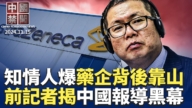【新唐人2013年04月12日訊】中共元老陳雲長子陳元,發表重溫中共前黨魁江澤民1993年的文章。文中力捧江澤民親自推動金融電子化,對遏制腐敗發揮了重要作用等。但評論認為,這篇文章透露﹕共產黨內部可能正在清算幾近崩潰的金融系統,涉及了江澤民。還有消息說,陳元主管的「開發銀行」近千億貸款,目前陷入巨額債務。
4月11號,《人民日報》發表陳元的文章,陳元在文章中提到﹕1993年中國金融電子化水平十分落後,當時,現金的大量使用及體外循環,對居民造成諸多不便,而且帶來逃稅、漏稅、走私、洗錢、腐敗等違法、違規現象,擾亂了國家經濟金融秩序。陳元表示,在這樣的形勢下,江澤民提出要實現金融管理電子化,這既有利於社會主義市場經濟建設,也有利於法制建設、制度建設和反腐敗鬥爭。
陳元文中力捧江澤民,說他開啟了中國金融電子化發展的新時代。
政論家 伍凡: 「中共的金融現狀,已經處於破產的狀態,崩潰的狀態, 其中有一個很重要的現象,就是有一個資金外流,資金外逃,大批的錢跑到外國去了, 是用甚麼手段傳的呢﹖你不可能用皮箱拎這麼多錢啊﹗所以完全用電子,用電子化,用電子系統,用網路系統,把這個錢慢慢傳出去了。」
美國的「中國社會民主黨」中央委員會主持人劉因全指出,江澤民在中國歷史上犯下了滔天罪行,面臨的指責很多,陳元跳出來寫這篇文章,是此地無銀三百兩,欲蓋彌彰。
美國「中國社會民主黨」中央委員會主持人 劉因全:「中國官員的腐敗,最主要是從江澤民當政以後開始惡化,我們知道中國官員腐敗的膨脹期、不可收拾,發展到非常惡劣的時期,就是江澤民時代,所以我認為,說江澤民推動甚麼東西制止腐敗這是不對的,不符合事實的。」
據中共自己的統計:江澤民當政期間,從1994年至1996年,每年洗錢已近1,500億﹔1997年至2000年,每年洗錢活動已達2,500億至3,000億元﹔2001年至2003年,每年高達4,000億至5,000億。而在2002年11月,江澤民交出中共總書記和國家主席那年,外匯非正常外流更是高達300億美元。
伍凡:「我的感覺,現在共產黨內部是不是正在清算貪污腐敗涉及到金融系統, 清算到最後責任誰來負責?總要找個總頭,誰開的頭,現在點來點去是點到江澤民頭上了,而陳元又來替江澤民講好話,來替他打包票,講的是相反的,現實是大批錢跑出去了,通過電子化系統跑出去了,所以這是一個現在共產黨內部激烈鬥爭的一個表現。」
與陳元的文章相對應的是,中共政協前主席李瑞環在「兩會」閉幕後,出版了一套名為《看法與說法》的四卷本著作,其中對中共政治、經濟、文化的諸多論斷,被指與習近平、李克強主政理念相同,最近更被大陸各大報章、網站爭相推薦、節錄。
伍凡分析認為,中共的任何一篇有份量的文章,都能反應出共產黨內部鬥爭的現實狀況。陳元的文章直接力捧江澤民,而李瑞環卻是和江澤民唱對臺戲。
伍凡:「你用蜻蜓點水罵兩句話,或者是你跟江澤民唱對臺戲,不解決任何問題, 共產黨殺了那麼多人,殺害法輪功,你能出來制止嗎?你沒有,你只不過不同意而已, 他這個東西,你說對習李有甚麼幫助?看不出來,不過可以對江澤民打兩個耳光而已。」
李瑞環曾經是江澤民入選中共總書記時的勁敵,當年被江澤民逼退﹔而陳元則是中共太子黨之一,有消息說,陳元主管的「開發銀行」近千億貸款,陷入了信貸危機。
Jiang Zemin’s Guilt Further Unveiled
Chen Yuan, the son of Chen Yun, one of the Chinese
Communist Party’s veterans, recently published an article in support of Jiang Zemin.
Chen’s article praised Jiang’s promoting of
electronic systems in the financial sector,
this has played a big role in curbing corruption.
Political observers think Chen’s article signals the CCP may be
rectifying the crumbling financial system, which involves Jiang.
Reportedly, China Development Bank headed by Chen Yuan
has been mired in debt of nearly 100 billion yuan.
On April 11, the People’s Daily published an article,
authored by Chen Yuan.
The article said, China was backward in financial
computerization in 1993.
In the same period, abundant use of cash daily caused
many inconveniences and breaches of law.
These included tax evasion, smuggling,
money laundering, corruption, among others.
These disrupted China’s economic and financial order.
In this situation, Jiang Zemin sought to electronify the
the nation’s financial management system.
Since this would be good to build the legal infrastructure,
and for the fight against corruption.
Chen Yuan praised the fact that Jiang Zemin had opened
a New era of China’s financial electronification.
(Critc) Wu Fan: “The CCP’s financial situation
has been on the brink of collapse.
An important sign is outflows of a large amount
of money to overseas.
How did they make it? Entirely through the electronic system.”
Liu Yinquan, chair of China Social Democratic Party,
comments.
Jiang Zemin has committed heinous crimes and
is facing some very heavy accusations.
Chen Yuan’s article only makes Jiang’s guilt
more conspicuous.
Liu Yinquan: “In China, officials’ corruption
became worse under the reign of Jiang Zemin.
If someone says that Jiang Zemin helped curb corruption,
I think it cannot be the truth.”
The CCP official data lists the amounts of money
laundered under Jiang Zemin’s rule.
In 1994-1996: nearly 150 billion yuan yearly;
In 1997-2000: 250-300 billion yuan yearly;
In 2001-2003: 400-500 billion yuan yearly.
In November 2002, Jiang Zemin retired as the
CCP general secretary and state president,
the non-normal cash outflow at that time reached
a value of 30 billion US dollars.
Wu Fan: “I think that the CCP’s anti-corruption effort
may have touched the financial sector.
Who will bear the blame? That’s the initiator.
So finally Jiang Zemin has become the focus.
Now Chen Yuan has stood up to back Jiang Zemin,
but is speaking the opposite of the truth.
The fact is that large sums of money have been
transferred abroad through the electronic system.
So I think it is a sign that the CCP’s infighting
will become more intense.”
In contrast, Li Ruihuan, former head of CCP Political
Political Consultative Conference, recently released
a four-volume set, “Views & Remarks.”
Some of his comments were on CCP politics,
economy and culture.
These were deemed similar to views held
by Xi Jinping and Li Keqiang.
Many major Chinese newspapers and web portals
have published excerpts of these articles.
Wu Fan says that any important CCP article mirrors
The reality of its infighting.
Chen Yuan’s article piled it on for Jiang Zemin,
whilst Li Ruihuan has set himself up against Jiang.
Wu Fan: “His remarks against Jiang are light reprimands,
which cannot truly play a big role.
The CCP has killed so many Chinese people.
When it killed Falun Gong practitioners,
did you stand up to stop it?
No, you didn’t. You just disagreed.
So are his articles going to help Xi-Li? I don’t see it,
but his comment really slaps Jiang Zemin’s face.”
Reportedly, Li Ruihuan was Jiang Zemin’s then
opponent for the post of CCP general secretary.
He was later driven off the political stage by Jiang.
Chen Yuan is the CCP princeling.
Media have reported that under the helm of Chen Yuan,
China Development Bank has been mired in a credit crisis,
involving nearly 100 billion yuan in loans.




























